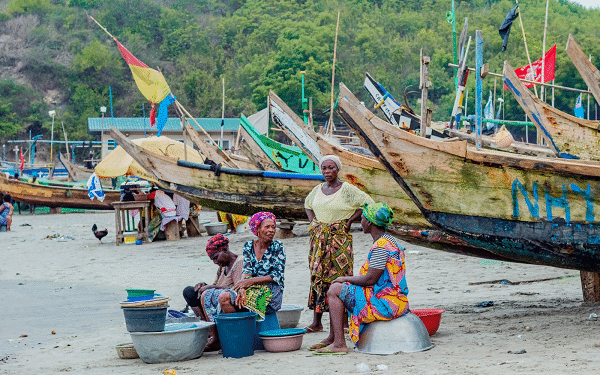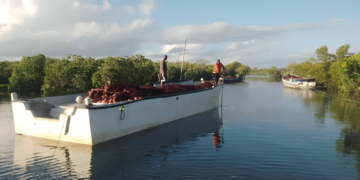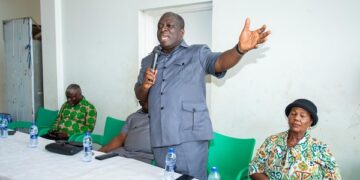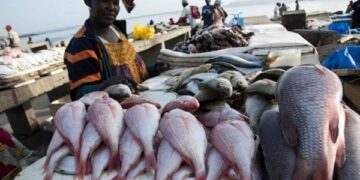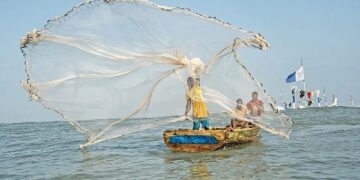ACCRA, Sept 14 (The African Portal) – Ghana has adopted a new fisheries act that introduces a series of regulations aimed at restoring severely depleted pelagic fish stocks and tackling illegal, unreported and unregulated (IUU) fishing. “The new Fisheries and Aquaculture Act introduces bold reforms aimed at ensuring sustainability, compliance, and improved livelihood, especially among small-scale fishers,” Eric Baah, the spokesperson for the Ghanaian Ministry of Fisheries and Aquaculture, said in an official statement.
The new act, signed into law by President John Dramani Mahama on Aug. 19, expands the country’s inshore exclusion zone (IEZ), strengthens enforcement mechanisms like mandatory electronic monitoring systems on industrial fishing vessels, and imposes higher penalties for those caught fishing illegally.
The expansion of the IEZ from 6 to 12 nautical miles (11 to 22 kilometers) off the coast is the change most anticipated by people who are part of the small-scale fisheries value chain; the government says it expects the exclusion of industrial fishing vessels from waters within the newly expanded IEZ will protect breeding grounds and reverse the near-collapse of pelagic fisheries and the livelihoods of about 120,000 artisanal fishers and food security.
A fish vendor in Accra in 2017. Ghana’s fisheries minister, Emilia Arthur, says the country’s new fisheries act will protect people’s access to the affordable animal protein provided by artisanal fishers working close to shore. Fish makes up more than 60% of animal protein in Ghanaians’ diets, and dwindling stocks of small fish like sardinella, anchovies and mackerel are a growing concern for fishers and scientists. Researchers analyzing fisheries commission data for landed catches between 1998 and 2018 found that these crucial fisheries are facing multiple, overlapping pressures, including overfishing by a growing canoe fleet, the effects of climate change, and the use of destructive and illegal fishing methods by industrial trawlers.
“We artisanal fishers need the extension because of the rampant and consistent incursion [by trawlers] into the IEZ over the years,” said Jojo Solomon, secretary to the Ghana National Canoe Fishermen’s Council (GNCFC).
According to U.K.-based NGO the Environmental Justice Foundation, trawlers have for years encroached into Ghana’s nearshore waters, despite the IEZ being exclusively reserved for small-scale fishing. This competition for fish has frequently caused collisions between trawlers and canoes and destroyed fishing gear, resulting in injuries, deaths and loss of livelihoods.
The expansion of the exclusion zone was fiercely opposed by the country’s industrial trawler association, which says that not all of its vessels are fit to operate farther offshore. “As trawlers are going to have to fish within deeper waters, they will have to adjust their fishing gear in order to reach the bottom to harvest the resources that are there — and that might come with huge costs,” Evans Arizi, a fisheries scientist who lectures at the University of Cape Coast, told Mongabay. This may lead to some trawler owners being pushed out of business.
Arizi said the biggest challenge in tackling the problem of illegal fishing will be enforcement. “If enforcement is poor, IUU is not going to be reduced. Enforcement should be stringent. That is the only way those illegalities can be reduced.”
A net filled with fish at Cape Coast. Small-scale fishers welcome the extension of Ghana’s inshore exclusion zone to protect pelagic fish stocks from industrial trawlers.
Solomon, from the canoe fisherman’s council, said that while the new law should mean industrial vessels will no longer operate within 22 km of the shore, illegal fishing may continue. “Now it is the responsibility of the government to strictly enforce this new law.”
The new act stipulates higher fines, stricter monitoring, and stronger enforcement of regulations, but it remains to be seen what this will look like in practice. Arizi said he hopes part of the reforms will include the introduction of an electronic monitoring system (EMS), which makes use of video cameras, sensors and GPS on industrial fishing vessels to tackle illegal fishing.
Ghana piloted an EMS in 2023, funded by USAID. According to a report on the pilot project, compiled by USAID when it ended in 2024, the monitoring system provided sufficient data to monitor compliance with fisheries laws. The U.S. government agency recommended rolling the EMS out to all industrial vessels as a condition of licensing, but stressed that a robust regulatory framework would be needed to successfully implement the mechanism. Further project activities stalled when the U.S. government cut most USAID funding worldwide earlier this year.
Other measures in the new act include restructuring the Fisheries Commission granting it greater independence to develop, manage and conserve fisheries and aquaculture resources; the closure of compliance gaps in the seafood export industry; and the introduction of more stringent penalties against illegal fishing.
In addition to protecting small-scale fishers and the source of affordable food their work provides, Ghana’s fisheries minister, Emilia Arthur, said the new law also aims to address the “yellow card” it received from the European Union in 2021 for insufficient action against IUU fishing. Without implementing new fisheries management reforms, the country risked receiving a “red card” in 2026, which would mean a ban on seafood exports to the EU, and cost Ghana an estimated $400 million in revenue.
Credit: Mongabay
